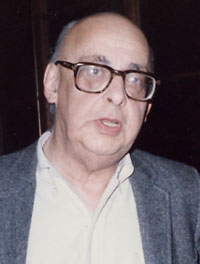UC Berkeley Press Release
UC Berkeley: Psychologist Leo Postman dies at 85
BERKELEY – Leo Joseph Postman, professor emeritus of psychology at the University of California, Berkeley, and a dominant figure in the study of human memory, died on April 22 of heart failure at his home in Marblehead, Mass. He was 85.
Postman was "a major theoretician in the development of the theory of forgetting," said friend and colleague Donald A. Riley, UC Berkeley professor emeritus of psychology. "His contributions were monumental."
Postman was listed in a 2002 article in the Review of General Psychology as one of the 100 most eminent psychologists of the last century.
 Leo Postman at a psychology department reunion in 1986. (Photo by Lynn Hasher/UToronto) |
"Within the field of human memory, the range of his contributions has been vast," wrote one of his former students, Geoffrey Keppel, professor emeritus of psychology at UC Berkeley, in recommending Postman for the Berkeley Citation. Postman received the award, the highest honor given to UC Berkeley faculty and staff, upon his retirement in 1987.
Postman founded in 1961 the Institute of Human Learning at UC Berkeley, which lives on today as the Institute for Cognitive and Brain Sciences, a center devoted to an interdisciplinary study of the mind and the brain.
Postman primarily studied perception, learning and memory. He participated in the beginnings of the "new look" school of perception that emphasized the role of cognitive factors such as emotions and expectations in determining what people perceive.
His main interest, however, was forgetting. Based on studies he began in 1958, he became known as the principal spokesman and architect of modern interference theory, the only comprehensive account of forgetting that exists today. The theory, Keppel wrote, holds that forgetting is the result of interference from a variety of sources, including past memories, various aspects of the current memory, and new memories acquired subsequently - that is, a dynamic interaction of the entire memory system, past and present.
Postman also was sensitive to the weaknesses of the theory, and spent the last part of his career investigating the mechanisms that conserve memory in the face of interference. Much of this research was conducted at the institute he founded and directed until 1977.
"Under Postman's leadership, the institute became an internationally famous center for the study of learning, where students and scholars could interact in a nurturing and productive environment," Keppel wrote.
He also served as chairman of the Department of Psychology for several years in the late 1950s.
Postman had a reputation for excellence in teaching, emphasizing clarity and organization. "Throughout his career, Postman's work has been notable for the exquisite clarity with which ideas are presented and for the depth of its scholarly understanding," Keppel wrote.
Born June 7, 1918, in St. Petersburg, Russia, Postman moved at an early age to New York City, obtaining his B.S. from the College of the City of New York in 1943 and his Ph.D. from Harvard University in 1946. He taught at Harvard from 1946 until 1950, interrupted by one year at Indiana University, and joined the UC Berkeley faculty in 1950.
During the period following World War II, the discipline of psychology underwent a significant change in the United States, from the European theoretic basis to a new approach based on experimentation. Postman was one of the leaders of this movement. His 1949 book, "Experimental Psychology, an Introduction," co-authored by James Egan, was one of the fundamental texts of the new field.
A 1947 book, "The Psychology of Rumor," co-authored by Gordon Allport, was the first scientific explanation of the origin and dissemination of rumors. It was of critical importance during the stressful post-war period and is currently receiving renewed interest in the wake of the events of Sept. 11, 2001.
In his first years at UC Berkeley, Postman was recognized nationally as a major figure in the field of perception and the role of motivation in perception. His research shifted, however, and he embarked on a long series of studies on learning with and without the intent to learn - what is referred to as incidental learning. He later switched to the study of forgetting, which he pursued until his retirement.
Postman was founder and first editor from 1962 to 1968 of the Journal of Verbal Learning and Verbal Behavior, associate editor from 1968 to 1974 of the Journal of Experimental Psychology, and co-editor from 1960 to 1962 of the American Journal of Psychology.
A member of the National Academy of Sciences and the American Psychological Association, he also served in 1968 as president of the Western Psychological Association, and in 1974 received the Warren Medal of the Society of Experimental Psychologists for outstanding achievement in experimental psychology.
Postman was married for 58 years to Dorothy Lerman Postman, who for many years worked with her husband at UC Berkeley and shared his love of psychology and of reading. They met when, as a graduate student teaching assistant, he graded her psychology paper. The couple moved to Marblehead a decade ago. In 2003, Dorothy Postman, who had a B.A. from Radcliffe College and an M.A. in psychology from Wellesley College, died after a long illness. Leo Postman leaves a sister- and brother-in-law, Lorraine and Edward Berman, of Marblehead, a niece and three nephews.
He
was buried at Temple Sinai Cemetery in Danvers,
Mass., on April 25.

